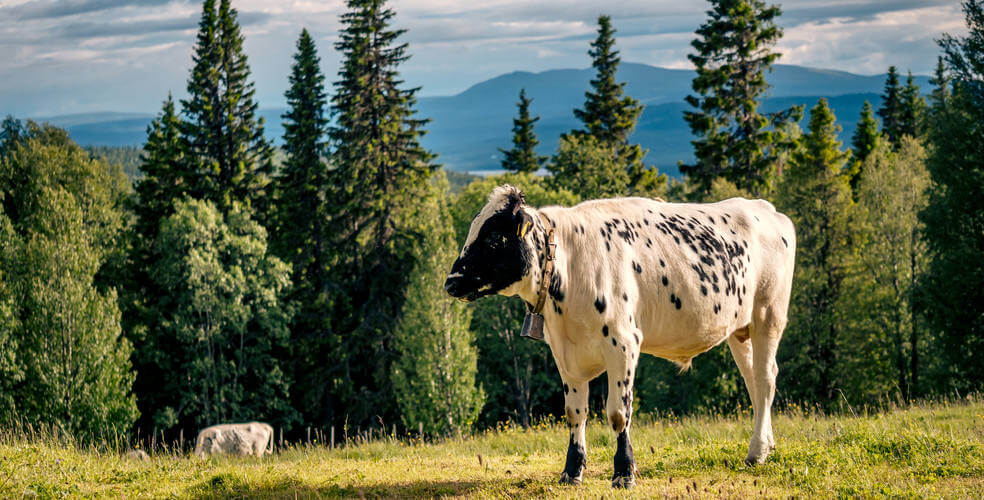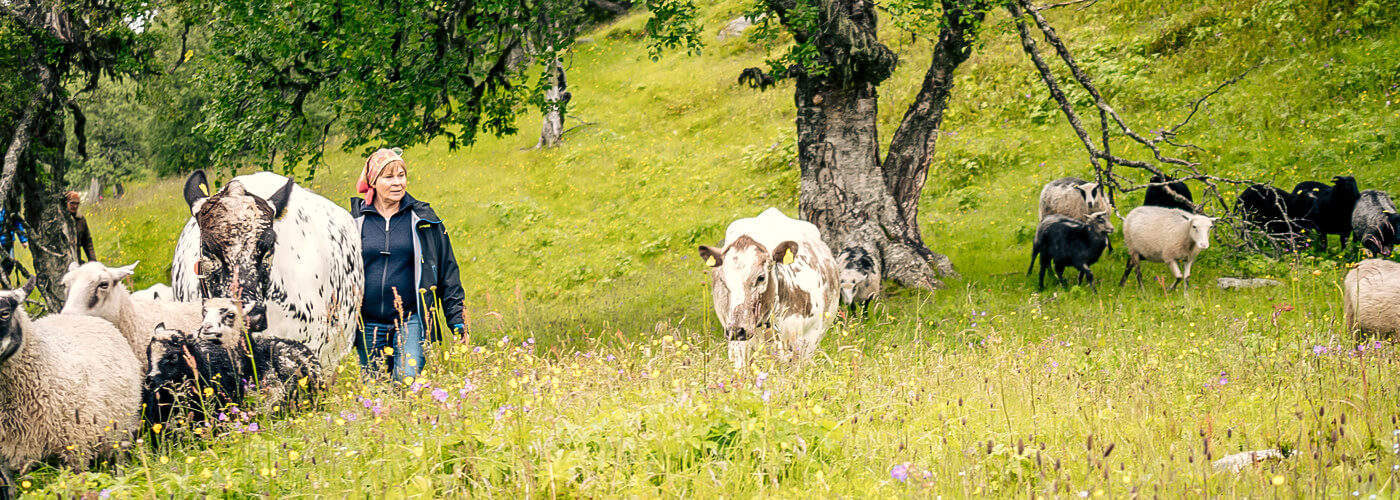Where time has stood still for a century
We find Myhrbodana on Nordrun’s southern slope more than 130 km north of Östersund. It is a 100-year-old summer farmstead run by Anita Myhr. With sweeping views of the mountains, hillside meadows and strangely shaped old birch trees, this is where Anita lives with her animals during the summertime. Anita works hard from early morning to late evening, and she does it with pleasure.
We drive the last part of the journey along a gravel road through a thick spruce forest. Finally we see the fence to our left, which surrounds a hillock with a number of wooden buildings. We turn up and park. When we get out of the car we hear the soft jingling of bells and some bleating here and there. The first thing we notice is the expansive view of the mountains, where the peaks are still speckled with patches of snow. Anita Myhr appears from the house, wearing a headscarf and an apron and gives us a warm welcome.
She refers to herself as an old-fashioned farm woman, and she runs the Myhrbodarna summer farmstead located outside the village of Valsjöbyn. Anita was born on Söder in Stockholm, but grew up as the daughter of a hotelier in Östersund. Despite being classed as a city girl, she has always preferred to be in the countryside. As a child, she loved staying with her relatives and friends of the family that lived on a farm.

In 1968, Anita started working as a primary school teacher in the village of Rötviken. It was during this time that she met her husband whose family had run Myhrbodarna for generations. Anita immediately fell for life at Myhrbodarna among the mountain cattle and goats, and she wanted to learn how to do it. But it wasn’t a piece of cake coming from the city and thinking she would be able to run a farm. Anita received tough schooling from her mother-in-law to learn everything about life on a summer farmstead. Anita’s mother-in-law was hard-working and meticulous and could often be perceived as hard. Anita believes this has rubbed off on her. But she points out that it is important for things to be done in the right way, and that you can’t wait to do the dishes and so on.
“The animals and the handling of foodstuff are the most important things. Routines are essential, especially up at the mountain farmstead, where it is a bit basic. Many people that come here to work have a very romantic idea of what working on a mountain farm involves, and it is romantic too, but that’s just a bonus.”
And the importance of routines is very obvious. When we visit Anita, there are also two farm-maids and a farmhand at the farm. Everything is always done here and now. Milk urns and feeding bottles are washed directly after being used. The cows’ udders are checked after milking and cleaned to keep them healthy.
Anita’s husband died in 2004 and she has run the farm by herself since then. She is now 71 years old, and has no intentions of stopping yet. However, this year she decided to advertise for extra labour and interest for working on a farmstead was huge. She received more than 40 applications from all over Sweden. Rene and Kattis, the farm-maids, both have an agricultural background and are used to milking cows and taking care of the raw materials produced by the animals. Farmhand Micke lives down in Valsjöbyn village and has helped Anita on the farm for a few years, and it is very clear that Anita and Micke work well together. When Anita says that they should put up a fence around the stream, she hardly has time to finish the sentence before Micke starts the task.

The days are long. Anita gets up at 5 o’clock every morning. She starts the day by lighting the fires in the stoves and heating up dish water. Then she brews some coffee and eats breakfast with the farm-maids. After breakfast it’s time to milk and wash the cows. Once that is done, the milk has to be separated and the animals put out to pasture. After that, it’s time to churn the butter and boil the cheese. Anita makes cheese from both cow’s milk and goat’s milk. Anita does not have any goats herself, but she buys the milk from a goat farm down in Valsjöbyn. Three days per week she also opens up the farmstead to visitors. On those days waffles have to made and wraps have to be served. In the evening the animals return from their pastures and the cows want to be milked. Later they eat dinner together before it’s time for Anita to see to her evening chores. This can be anything from baking a cake from the buttermilk to doing the laundry and planning tomorrow’s dinner. There is always something to do and work is often physically hard. Despite that, Anita feels that she always gets more energy when she is at the mountain farm.
“The days often start at five and go on until eleven or twelve before I go to bed. I’m really tired then, but it’s a nice tiredness. Even though there’s always work to be done, some days more than others, being here always gives me strength. Just seeing how superb the animals feel when they are allowed to roam freely. They go out in the morning and come home every evening.”

Anita has Mountain cattle and Åsenfår sheep. Åsenfår are an endangered species of sheep that originate from Dalarna. They are small and dainty and move around easily in mountain terrain. Mountain cattle are also an endangered species. As the name suggests, these cows have adapted to the colder climate. Even though they roam freely and share pasture lands with both reindeer and bear, Anita has never lost an animal. Anita believes that this is because the sheep and lamb graze alongside the cows.
“The County Administrative Board is amazed that I’ve never lost an animal. But the sheep and lamb have learnt to go with the cows. And mountain cattle are the breed that manage best of all in open pastures. They can be aggressive if they feel threatened and the herd works together to scare off predators. They don’t back away and they even protect the sheep and lamb that otherwise wouldn’t survive if they didn’t stay with the cows.”

Right before Midsummer, Anita hikes from the farm down in Valsjöbyn village up to the mountain farmstead together with her animals, and the season opens on Midsummer day with high mass. It is an old tradition and that is when the first visitors come. There is music and Anita serves coffee and wraps made of thin bread. Visitors are an important part of life at the farmstead for Anita. As the daughter of a hotelier, she learned how to take care of people and make them feel welcome from an early age. Anita really enjoys being able to combine life on the farmstead with tourism. She has noticed that more and more people are becoming very interested in traditional farming, and many want to get away from the stress that is often part of city life. And Myhrbodarna is truly a place that touches most of its visitors in one way or another. The sweeping view of the mountains, the hillside meadows, proximity to the animals and the strangely shaped old birch trees create an unusual calmness.
“The best thing is all the people that visit us here and call me in the winter. They write letters and send cards telling me how much they appreciated their visit to us and that they want to come again. It’s fantastic.”
When we ask Anita how she came across Woolpower, she answers that she has worn Woolpower clothes for as long as she can remember. She has used them both for sports and when out in the mountains, and today Woolpower clothes are her standard gifts for her grandchildren. The days and nights up at the mountain farmstead can be cold, and Anita always has Woolpower clothes close by.
“It can be really cold, rough weather when I go to bed. So it’s lovely to throw on thick warm base layers before I creep under the covers. I often pop by Woolpower when I’m in Östersund. I think they have fantastic clothes.”

ABOUT ANITA
Job:
Farm woman
Age:
71 years
Favorite Woolpower garment:
My favourite item of clothing is the one I throw on most often, and that is my Full Zip Jacket 400. It is always close at hand when I feel a little cold, and it warms me up so nicely. But also the base layers. And the socks! Thicker or thinner, depending on what I need. I really like them a lot.




